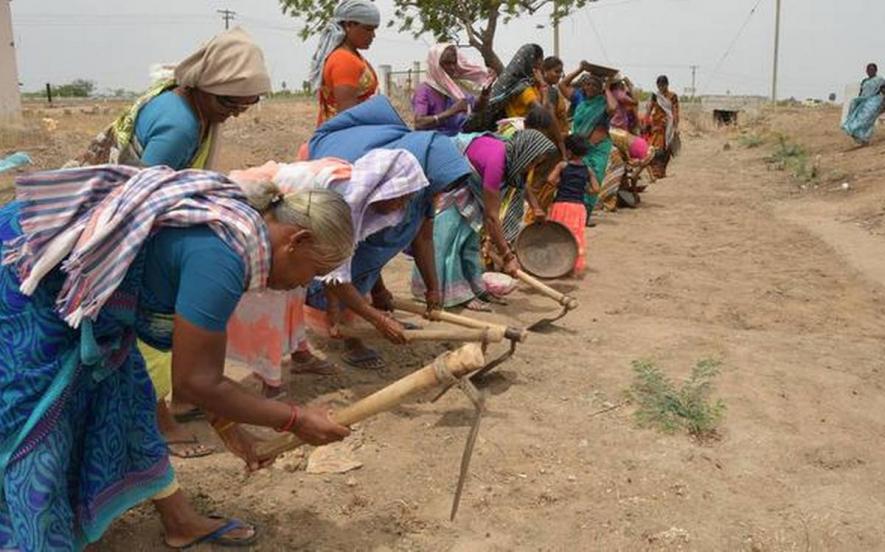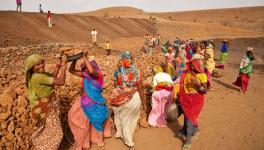Implement MGNREGA to Deal with Unemployment Crisis, Eminent Citizens Urge Rural Development Ministry

Representational image. | Image Courtesy: The Hindu
A group of eminent citizens and members of civil society have written to the Union Minister of Rural Development and Panchayati Raj, Narendra Singh Tomar, demanding immediate measures to implement the Mahatma Gandhi National Rural Employment Guarantee Act to deal with the economic crisis resulting from the ongoing countrywide lockdown.
The letter states that the country is facing an unprecedented unemployment crisis which is likely to last for several months. At a time when the livelihoods of millions of people have become uncertain, “given the legal obligation and the infrastructure already in place, using NREGA creatively will go a long way to help the poor” says the letter.
In this regard, the letter puts forward a few recommendations for implementing the rural employment scheme in the next three months, including additional budget allocation of at least Rs 1 lakh crore. The eminent citizens and members of civil society also urge the government to proactively implement MGNREGA and make work available to all, especially through the release of advance funds to Gram Panchayats to start works under the scheme.
They also demand the simplification of the procedure of application for job cards which are necessary to find work under the scheme and also suggest the emulation of an urban employment guarantee programme based on MGNREGA. Along with this, the letter also demands that dry rations be provided in addition to full minimum wages in cash for the next three months. Also, those who are not permitted to work due to the existing medical advisory should be paid full wages till they are allowed to resume work.
The complete letter is produced below.
To
The Union Minister
Ministry of Rural Development and Panchayati Raj
Government of India
New Delhi
1st May 2020
Dear Shri Narendra Singh Tomar,
We are writing to request you to take urgent and immediate steps to enable NREGA to respond to the economic crisis being faced by the country today.
Due to an unprecedented unemployment crisis which is likely to last for several months, there is a tremendous demand for NREGA work across the country. The Government should respond to this demand urgently as the lives and livelihoods of millions are in question. Given the legal obligation and the infrastructure already in place, using NREGA creatively will go a long way to help the poor in this time of need.
We write to you with the following temporary recommendations for implementing NREGA for the next three months:
1. Additional Budget allocation & Proactive implementation of NREGA and giving work to all
a. The Government should immediately allocate additional resources and make provision for a total of at least Rs.1 lakh crore for at least the next three months. This will allow uninterrupted implementation till the time by which an accurate estimation of the upcoming demands can be mapped.
b. Contradictory orders issued by the Government of India to start NREGA works, in the light of maintaining strict physical distancing has led to confusion amongst the front line functionaries. Consequently, implementation of NREGA has suffered. Implementing agencies must proactively open works in every village and give work to all those who turn up at the worksites. Demand should not be made a prerequisite for opening works. Demand registration can also be done at the worksite itself. This can be done using a paper-based system with a handwritten dated receipt. The details can be entered on the computer in the evening to ensure that there is no delay in registering work demand. As you would appreciate, the demand of work is a right for the worker.
c. Funds may be released in advance to the Gram Panchayat to run works and Sarpanchs be given power to authorize opening of works.
2. Simplify Procedures and Remove Difficulties
a. All procedures for NREGA should be substantially simplified. Entitlements for NREGA should be made applicable for an individual and not for a household, and every individual must be provided work without any restriction. Anybody willing to work must be given work for the full year and not have 100 days in a year limitation.
b. A large number of rural residents don’t have a job card and getting new job cards might be time consuming. As such, any person wanting to do NREGA work must be allowed to work irrespective of whether they have a job card. Job card registration can be done at the worksite.
c. Sanctioning of works and wage/material payments need to be simplified. Gram Panchayats should be able to sanction schemes on minimum documentation and payments should be routed via Gram Panchayats in order to ensure quick disbursals.
d. All biometric based payment systems must be avoided.
3. Urban Employment Guarantee Act
While many returning migrants are from rural areas, there are significant returning migrants from small towns. Many such people have lost their livelihoods and are shaken. This can be fruitfully addressed to some extent by emulating the potential and the structures of NREGA towards an urban employment guarantee programme. Such a programme can be powerful in ecological restoration and moving towards a greener future in light of climate crisis too.
4. Pay Full Minimum Wages
a. The Government must ensure that NREGA workers receive the full minimum NREGA notified wage rate for the State within 7 days of completion of work instead of 15 days. The Schedule of Rates could be suitably modified to reduce work output required for earning the minimum wage rate by 50%, or piece-rate payment of wages should be suspended and wage payments on the basis of time rate be initiated.
b. Self-certification of the extent of work completed must be made adequate to process wage payments, which can then be later re-verified.
c. Provide dry rations in addition to full minimum wages for the next three months.
5. Cash Payment of Wages
a. Timely payment of wages is of critical importance at present. Overcrowding in rural banks is a common problem. To ensure good practices of physical distancing in such times, NREGA wage payments should be made in cash by the Gram Panchayat.
b. To ensure that transparency and accountability is maintained, cash payments should be made for every ward publicly on a predetermined day. The example set by the State of Odisha for releasing pension payments publicly at the Gram Panchayat can be followed.
6. Women and Elderly in NREGA
a. All those above the age of 50 years who are not being permitted to come to work, should be paid their full minimum wage per day, for the duration of the period that they are not being permitted to work.
b. Along the same lines, all ailing and disabled workers who are not permitted to work due to the existing medical advisory should be paid full wages till they are allowed to resume work.
c. The Central Government should also ensure payment of 90 days of wages to all pregnant women workers in the 2nd and 3rd trimester as well as to the lactating women with infants aged less than 6 months.
7. Helpline for Demand and Job Card Registration
a. Helpline numbers must be constituted where workers can call and register their demand for work and apply for any job card related procedures. The helpline number should be able to register demand electronically on the MIS as soon as the demand is registered. This is essential because demand for work applications are not being accepted on the ground. Each block must have a separate helpline number to cater to all the panchayats in that block. This is to ensure that there are no language issues on the phone and to avoid helplines getting over burdened. There need to be multiple people in each block running these helplines.
8. Red Zone Classification Preventing NREGA Works
a. Declaring a district as a red zone and not permitting NREGA works across the entire district is causing many hardships. Careful consideration needs to be paid to identify only affected blocks with precision, so that NREGA works can be initiated in blocks within a red zone district which does not have positive cases of Covid 19
9. Balance Between Individual and Community Works
a. There is a need for implementing agencies to enable works on individual lands to facilitate completion of work while aligning with physical distancing norms. However, there is a need to balance works on individual lands with community works so as to ensure that workers with no individual landholdings are not crowded out of the programme
b. Work on individual landholdings should be encouraged as it helps to generate work without compromising on physical distancing prerequisites.
c. Landless workers should be given a priority for works undertaken on common and revenue lands.
We request you to consider these recommendations at the earliest and take the necessary action that this emergency warrants.
- Abha Bhaiyya, JAGORI, Himachal Pradesh
- Abhay Kumar, Former Member, Central Employment Guarantee Council (CEGC), Karnataka
- Amit Basole, Associate Professor, Azim Premji University
- Anindita Adhikari, Doctoral Student, Brown University
- Annie Raja, General Secretary, National Federation of Indian Women
- Anuradha Talwar, Paschim Banga Khey Majoor Samity
- Aruna Roy, Founder Member, Mazdoor Kisan Shakti Sangathan, Rajasthan
- Arundhuti Dhru, National Alliance of Peoples’ Movements
- Ashish Ranjan, Founder Member, Jan Jagran Shakti Sangathan, Bihar
- Ashwani Kulkari, Pragati Abhiyan, Maharashtra
- Asmi Sharma, Activist, Delhi
- Avik Saha, National Convenor, Jai Kisan Andolan
- Chakradhar, National Campaign for Peoples’ Right to Information, Andhra Pradesh
- Cheryl, Secretary, National Campaign for Judicial Accountability Reforms
- Harsh Mander, Director, Center for Equity Studies
- Jagdeesh Rao, Executive Director, Foundation for Ecological Security
- James Herenj, NREGA Watch, Jharkhand
- Jayati Ghosh, Professor, Jawaharlal Nehru University
- Jean Dreze, Visiting Professor, Ranchi University
- Jyothi Krishnan, Activist, Kerala
- Kamayani Swamy, Jan Jagran Shakti Sangathan, Bihar \
- Karuna M., Rural Development Consultant
- Madhuri Krishnaswamy, Jagrut Adivasi Dalit Sangathan
- Manas Ranjan Mishra, Activist, Odisha
- Nachiket, Mazdoor Kisan Shakti Sangathan
- Narendranath, PRADAN
- Nikhil Dey, Member, SR Abhiyan, Rajasthan
- Neeta Hardikar, ANANDI, Gujarat
- Paras Banjara, MKSS
- Rajendran Narayanan, Assistant Professor, Azim Premji University
- Rakshita Swamy, Social Accountability Resource Unit
- RD Vyas, Aastha Organization, Rajasthan
- Reetika Khera, Associate Professor, Indian Institute of Technology, Ahmedabad
- Richa, Sangtin, Uttar Pradesh
- Siraj Dutta, Right to Food Campaign, Jharkhand
- Vineet Bhambu, MKSS
- Ved Arya, National Convenor, Rapid Rural Community Response to COVID 19
- Yogendra Yadav, Swaraj Abhiyan
Get the latest reports & analysis with people's perspective on Protests, movements & deep analytical videos, discussions of the current affairs in your Telegram app. Subscribe to NewsClick's Telegram channel & get Real-Time updates on stories, as they get published on our website.























